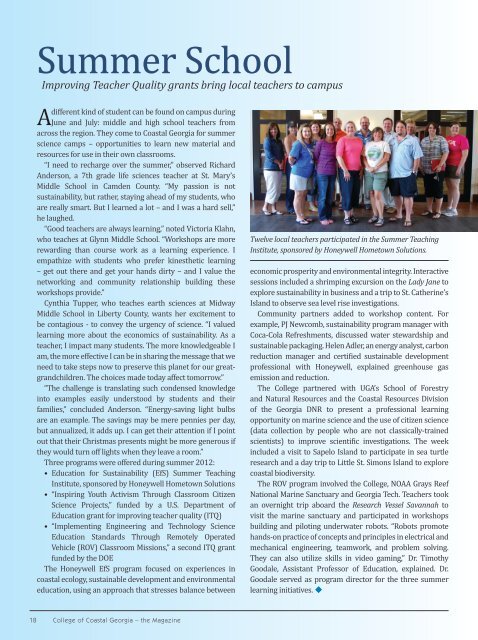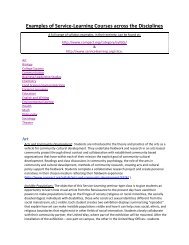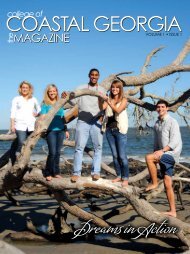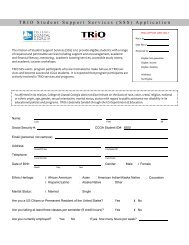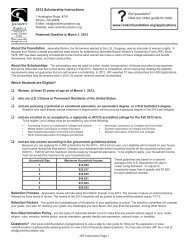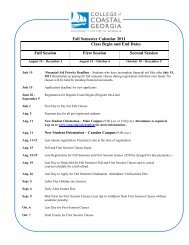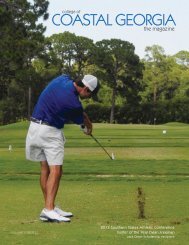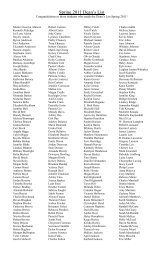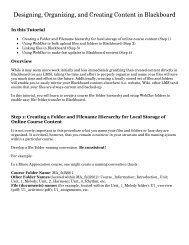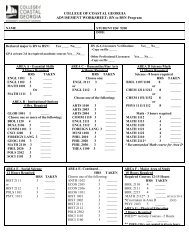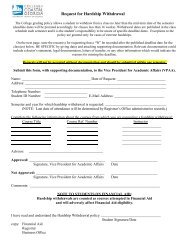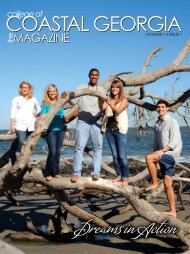the Magazine, Volume 2 Issue 2 - The College of Coastal Georgia
the Magazine, Volume 2 Issue 2 - The College of Coastal Georgia
the Magazine, Volume 2 Issue 2 - The College of Coastal Georgia
Create successful ePaper yourself
Turn your PDF publications into a flip-book with our unique Google optimized e-Paper software.
Summer SchoolImproving Teacher Quality grants bring local teachers to campusdifferent kind <strong>of</strong> student can be found on campus duringA June and July: middle and high school teachers fromacross <strong>the</strong> region. <strong>The</strong>y come to <strong>Coastal</strong> <strong>Georgia</strong> for summerscience camps – opportunities to learn new material andresources for use in <strong>the</strong>ir own classrooms.“I need to recharge over <strong>the</strong> summer,” observed RichardAnderson, a 7th grade life sciences teacher at St. Mary’sMiddle School in Camden County. “My passion is notsustainability, but ra<strong>the</strong>r, staying ahead <strong>of</strong> my students, whoare really smart. But I learned a lot – and I was a hard sell,”he laughed.“Good teachers are always learning,” noted Victoria Klahn,who teaches at Glynn Middle School. “Workshops are morerewarding than course work as a learning experience. Iempathize with students who prefer kines<strong>the</strong>tic learning– get out <strong>the</strong>re and get your hands dirty – and I value <strong>the</strong>networking and community relationship building <strong>the</strong>seworkshops provide.”Cynthia Tupper, who teaches earth sciences at MidwayMiddle School in Liberty County, wants her excitement tobe contagious - to convey <strong>the</strong> urgency <strong>of</strong> science. “I valuedlearning more about <strong>the</strong> economics <strong>of</strong> sustainability. As ateacher, I impact many students. <strong>The</strong> more knowledgeable Iam, <strong>the</strong> more effective I can be in sharing <strong>the</strong> message that weneed to take steps now to preserve this planet for our greatgrandchildren.<strong>The</strong> choices made today affect tomorrow.”“<strong>The</strong> challenge is translating such condensed knowledgeinto examples easily understood by students and <strong>the</strong>irfamilies,” concluded Anderson. “Energy-saving light bulbsare an example. <strong>The</strong> savings may be mere pennies per day,but annualized, it adds up. I can get <strong>the</strong>ir attention if I pointout that <strong>the</strong>ir Christmas presents might be more generous if<strong>the</strong>y would turn <strong>of</strong>f lights when <strong>the</strong>y leave a room.”Three programs were <strong>of</strong>fered during summer 2012:• Education for Sustainability (EfS) Summer TeachingInstitute, sponsored by Honeywell Hometown Solutions• “Inspiring Youth Activism Through Classroom CitizenScience Projects,” funded by a U.S. Department <strong>of</strong>Education grant for improving teacher quality (ITQ)• “Implementing Engineering and Technology ScienceEducation Standards Through Remotely OperatedVehicle (ROV) Classroom Missions,” a second ITQ grantfunded by <strong>the</strong> DOE<strong>The</strong> Honeywell EfS program focused on experiences incoastal ecology, sustainable development and environmentaleducation, using an approach that stresses balance betweenTwelve local teachers participated in <strong>the</strong> Summer TeachingInstitute, sponsored by Honeywell Hometown Solutions.economic prosperity and environmental integrity. Interactivesessions included a shrimping excursion on <strong>the</strong> Lady Jane toexplore sustainability in business and a trip to St. Ca<strong>the</strong>rine’sIsland to observe sea level rise investigations.Community partners added to workshop content. Forexample, PJ Newcomb, sustainability program manager withCoca-Cola Refreshments, discussed water stewardship andsustainable packaging. Helen Adler, an energy analyst, carbonreduction manager and certified sustainable developmentpr<strong>of</strong>essional with Honeywell, explained greenhouse gasemission and reduction.<strong>The</strong> <strong>College</strong> partnered with UGA’s School <strong>of</strong> Forestryand Natural Resources and <strong>the</strong> <strong>Coastal</strong> Resources Division<strong>of</strong> <strong>the</strong> <strong>Georgia</strong> DNR to present a pr<strong>of</strong>essional learningopportunity on marine science and <strong>the</strong> use <strong>of</strong> citizen science(data collection by people who are not classically-trainedscientists) to improve scientific investigations. <strong>The</strong> weekincluded a visit to Sapelo Island to participate in sea turtleresearch and a day trip to Little St. Simons Island to explorecoastal biodiversity.<strong>The</strong> ROV program involved <strong>the</strong> <strong>College</strong>, NOAA Grays ReefNational Marine Sanctuary and <strong>Georgia</strong> Tech. Teachers tookan overnight trip aboard <strong>the</strong> Research Vessel Savannah tovisit <strong>the</strong> marine sanctuary and participated in workshopsbuilding and piloting underwater robots. “Robots promotehands-on practice <strong>of</strong> concepts and principles in electrical andmechanical engineering, teamwork, and problem solving.<strong>The</strong>y can also utilize skills in video gaming,” Dr. TimothyGoodale, Assistant Pr<strong>of</strong>essor <strong>of</strong> Education, explained. Dr.Goodale served as program director for <strong>the</strong> three summerlearning initiatives. u18 <strong>College</strong> <strong>of</strong> <strong>Coastal</strong> <strong>Georgia</strong> – <strong>the</strong> <strong>Magazine</strong>


